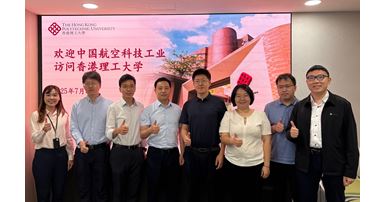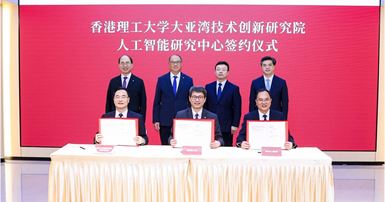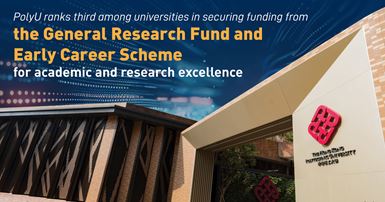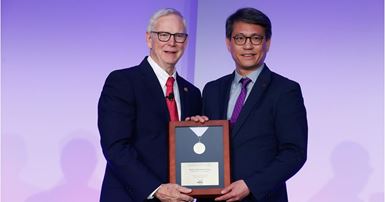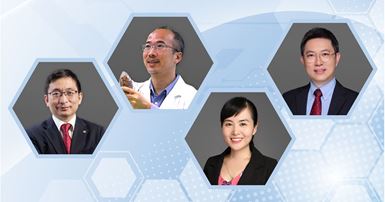PolyU research projects win funding support from RAISe+ Scheme
The Innovation and Technology Commission of the HKSAR Government has recently announced the second batch of projects selected for funding under the Research, Academic, and Industry Sectors One-plus (RAISe+) Scheme. Among the successful projects, four from The Hong Kong Polytechnic University (PolyU) showcase the University’s research excellence and strong commitment to commercialisation of its research outcomes.
Prof. Christopher CHAO, PolyU Vice President (Research and Innovation) congratulated the PolyU research teams, stating, “We are delighted that four PolyU research projects have been named among the second batch of those funded under the RAISe+ Scheme. This achievement not only underscores the University’s robust research capabilities, but also the strong confidence that government, industry and community stakeholders have placed in our ability and efforts in driving innovations and translation of research outcomes.
Moving forward, PolyU will continue to foster effective collaboration among the Government, industry, academia and research sectors, injecting new momentum into its research projects and accelerating the translation of research outcomes into real-world impact, which in turn contributes to the development of Hong Kong, our Nation and the world.”
The funded projects cover a wide range of innovation and technology fields, including AI and robotics, Chinese medicine, computer science/information technology, and electrical and electronic engineering. Details of the projects are listed below
Project Title
Project Leader
Project Description
High-Speed 3D Stacked AI Vision Sensors
Prof. Yang CHAI
Associate Dean, Faculty of Science; Chair Professor of Semiconductor Physics, Department of Applied Physics; and Director, Joint Research Centre for Microelectronics
This project focuses on the development and commercialisation of an advanced AI vision sensor with high-speed operation, high dynamic range, and ultra-low power consumption. The sensor overcomes key limitations of conventional image sensors, particularly motion blur in high-speed scenarios. Key applications of the AI vision sensor include security surveillance systems, autonomous navigation, and motion analysis in extended reality devices and smartphones.
The sensor achieves high-speed, high-dynamic-range, and low-power imaging through the integration of conventional image sensors with dedicated visual information processing chips.
Novel Nutraceuticals for Neurodegenerative Diseases
Prof. Simon Ming-yuen LEE
Cally Kwong Mei Wan Professor in Biomedical Sciences and Chinese Medicine Innovation; Chair Professor of Biomedical Sciences, Department of Food Science and Nutrition; and Director, PolyU-BGI Joint Research Centre for Genomics and Synthetic Biology in Global Ocean Resources
This project develops novel nutraceuticals and drugs derived from natural resources for treating neurodegenerative diseases. It establishes the LifeChip technology platform, combining next-generation DNA sequencing, AI-driven discovery, advanced chemical separation, high-throughput in vivo screening, and synthetic biology. Focusing on neurodegenerative diseases like Alzheimer’s and Parkinson’s, as well as neurological disorders including insomnia, depression, and anxiety, this integrated approach delivers a comprehensive solution for both prevention and treatment using innovative nutraceuticals with unique mechanisms of action. For instance, the development candidate Oxyphylla® is a first-in-class drug targeting α-synuclein, an emerging therapeutic target for Parkinson’s disease. Oxyphylla® is anticipated to become a disease-modifying therapy, offering a breakthrough in neurological health.
Reallm: World-leading Enterprise GenAI Infrastructure Solution
Prof. YANG Hongxia
Executive Director, PolyU Academy for Artificial Intelligence;Associate Dean (Global Engagement), Faculty of Computer and Mathematical Sciences; and Professor, Department of Computing
The project aims to develop a comprehensive Generative Artificial Intelligence (GenAI) infrastructure solution, including by: establishing a decentralised pretraining and post-training system architecture to support distributed model training frameworks; developing a domain-adaptive continual pretraining and post-training system to continuously optimise large language models using domain-specific unlabelled data, enabling adaptation to target domain distributions; and designing a low-bit training framework that requires only half the computational and storage resources of traditional training, while still achieving high-quality, end-to-end training from pretraining to post-training—significantly lowering the entry barrier for enterprises. Ultimately, the project will launch a platform specifically designed to enhance cross-domain collaboration through enterprise-grade GenAI services, including Software-as-a-Service, Platform-as-a-Service, and Infrastructure-as-a-Service.
Tunable Laser Chip Based on Metasurface Structure and its Application
Prof. YU Changyuan
Director, PolyU-Jingjang Technology and Innovation Research Institute; and Professor, Department of Electrical and Electronic Engineering
This project pioneers a novel broadband tunable laser chip that, for the first time, integrates both a metasurface reflector and phase-change materials within a vertical-cavity surface-emitting laser. This enables an ultra-high quality factor resonant cavity and dynamic continuous tuning of the output wavelength over an exceptionally wide bandwidth (40nm).
Compared to traditional laser structures, the chip not only features a more compact design but also achieves the same kHz-level tuning speed as leading international competitors. With the cost just one-twentieth that of existing market solutions, the chip is expected to achieve widespread adoption in battery monitoring systems, industrial production processes, autonomous driving technologies and high-speed optical communication modules.
Inaugurated in 2023, the RAISe+ Scheme aims to provide funding, on a matching basis, for at least 100 research teams from universities funded by the University Grants Committee which demonstrate strong potential to evolve into successful startups. Each approved project will receive funding support ranging from HK$10 million to HK$100 million.


